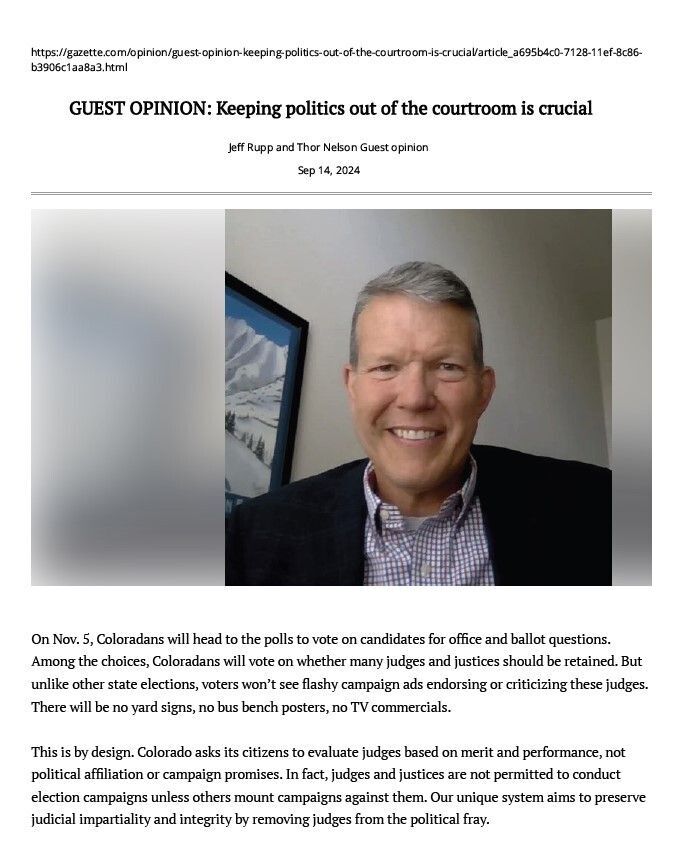
[Note: This CJI op-ed was published September 14, 2024, on the Gazette's website. Reprinted here with permission.]
On Nov. 5, Coloradans will head to the polls to vote on candidates for office and ballot questions. Among the choices, Coloradans will vote on whether many judges and justices should be retained. But unlike other state elections, voters won’t see flashy campaign ads endorsing or criticizing these judges. There will be no yard signs, no bus bench posters, no TV commercials.
This is by design. Colorado asks its citizens to evaluate judges based on merit and performance, not political affiliation or campaign promises. In fact, judges and justices are not permitted to conduct election campaigns unless others mount campaigns against them. Our unique system aims to preserve judicial impartiality and integrity by removing judges from the political fray.
Recent attacks in the press and elsewhere have intentionally mischaracterized the nonpolitical nature of our judicial selection and retention process. And while any of us can disagree with the outcomes of individual cases, the system protects us from unwarranted political interference in our courts.
Since 1966, Colorado has used a merit-based system for selecting and retaining judges. The approach was implemented to address concerns about campaign contributions influencing judicial decisions. Under the previous system, judges campaigned for office just like other politicians — raising money, making promises, and potentially compromising their impartiality in the process. Not anymore.
Here’s how Colorado’s judicial merit system works: When there’s a vacancy on the bench, a nonpartisan judicial nominating commission reviews applications from qualified candidates. For local District and County Court judges, there is a commission in each of the state’s 22 judicial districts. Each commission is composed of seven local attorneys and nonattorneys, such as educators and community leaders.
The majority of commissioners are nonattorneys, and no more than four of the commission members can be from the same political party. There is one commission for the statewide Court of Appeals and Supreme Court, composed of fifteen attorneys and nonattorneys from the eight federal congressional districts. Most of the commissioners are nonattorneys, and no more than eight can be from the same political party.
The applicants do not mention political affiliation and it’s not a consideration at any point in the process. They focus on their legal qualifications, experience, integrity, and public service. An evaluation commission then does a deep dive into the applicants, reaching out to references and contacting others who have worked with or appeared before the applicant in a professional capacity.
Next, they interview the applicants in person, assessing each candidate’s temperament, communication skills, and understanding of the role. After careful deliberation, the commission nominates two or three finalists to the governor, who then conducts their own background check before making the final appointment. For Denver County Court judges, the mayor makes the appointment instead of the governor.
But the process doesn’t stop there. Once appointed, judges serve an initial two-year term. Then, in the next general election, voters decide whether to retain them for a full term. If retained, Supreme Court justices serve 10-year terms, Court of Appeals judges serve 8-year terms, District Court judges serve 6-year terms and County Court judges serve 4-year terms before facing another retention vote.
Sitting judges are evaluated by a judicial performance commission. Like the nomination commissions, there is a local commission for each of the 22 judicial districts and a separate commission for the appellate courts. Each performance commission for the judicial districts is composed of 10 individuals, more nonattorneys than attorneys.
The commission for the appellate courts is composed of 11 local nonattorneys and attorneys. The commissions conduct surveys of those who have appeared before each judge, including litigants, attorneys, jurors, witnesses, and court staff and obtain their opinions about the judge’s integrity, fairness, impartiality, legal knowledge, communication skills, temperament and diligence.
At least one commissioner observes the judge in judicial proceedings, and the commission interviews the judge and follows-up on the survey results. The commission then publishes its determination of whether the judge “Meets” or “Does Not Meet” judicial performance standards. Their 2024 Judicial Performance Evaluations are published online at KnowYourJudge.com and in the voter Blue Book distributed before elections.
This merit-based retention system offers several key advantages. First, it removes money from the selection process. Judges don’t have to fundraise or accept campaign contributions that could compromise their impartiality. Second, it allows judges to focus on their judicial duties rather than spending half of their time campaigning. Third, it reduces partisan bias in the nominating process. In systems where judges are selected through party politics, potential candidates often need to be active in those parties to gain support. This often excludes qualified individuals who aren’t politically connected or part of the inner circle.
Colorado judges are evaluated based on their qualifications and performance, not ideological leanings. This opens the judiciary to a wider pool of talented candidates.
Lastly, the Colorado system provides accountability. If a judge consistently underperforms or acts unethically, the performance commissions will flag this in their evaluations. Voters can then choose not to retain that judge. As we approach this November’s retention elections, Colorado voters have a valuable resource to assess each judge’s performance.
The Office of Judicial Performance Evaluation website (KnowYourJudge.com) provides comprehensive performance evaluations for each judge. Colorado’s judicial merit system isn’t perfect, but it has served our state well for over 50 years.
Jeff Rupp is the executive director, and Thor Nelson the board chair at The Colorado Judicial Institute.

